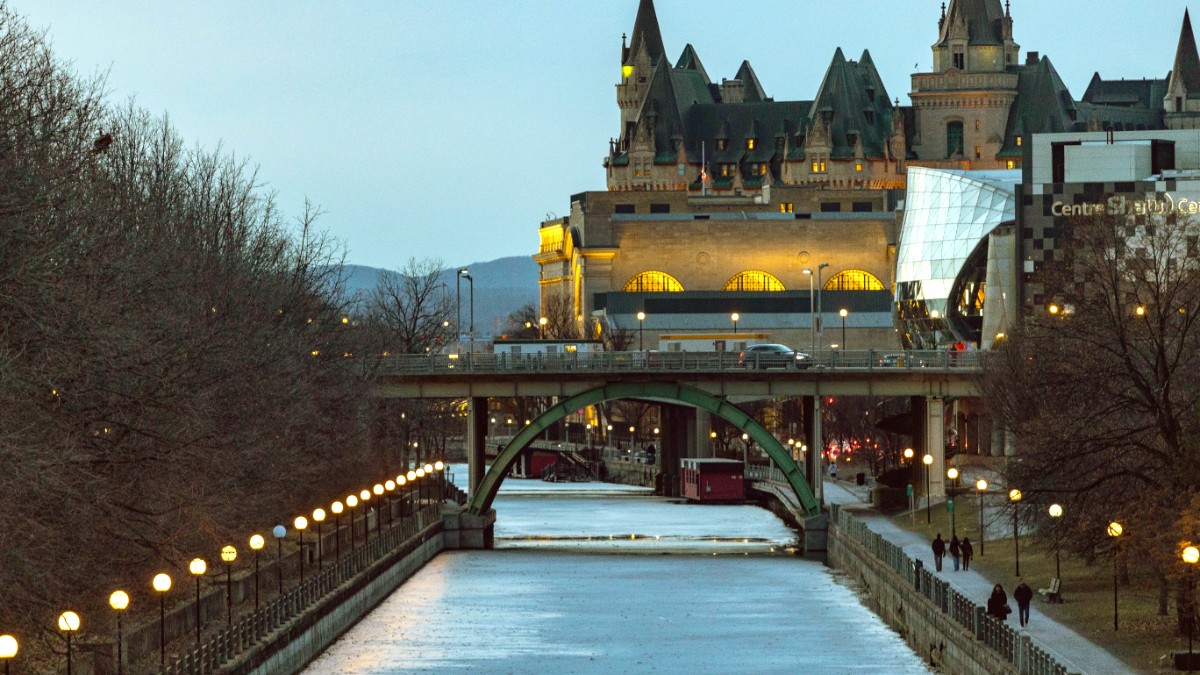
Ontario, Canada
Winter (December to March): Ottawa experiences cold, snowy winters. January, the coldest month, typically sees average temperatures around -10°C (14°F), often dropping to -20°C (-4°F) or colder. Heavy snowfall creates a picturesque, snow-covered landscape. Humidity is low, making the cold feel crisp. Spring (April to May) brings a gradual thaw and warming. Temperatures rise from single digits in April to the mid-teens in May. This period is wet, with melting snow and frequent rain showers. The city comes alive as flowers bloom, notably during the Canadian Tulip Festival in May.
Summer (June to August): Summers are warm to hot and humid. July averages around 21°C (70°F), with daytime highs often exceeding 25°C (77°F). Humidex values reach 35°C (95°F) or higher. Thunderstorms occur regularly. Fall (September to November) presents clear, sunny days before the winter chill. Temperatures transition from the mid-teens in September to near freezing in November.
Ottawa experiences extreme cold and heavy snowfall in winter. Hot and humid conditions with thunderstorms mark the summer.
Always consult the local forecast before your trip and adjust your packing list accordingly.
June-August & Sep-Oct
Warm weather, numerous festivals, city.
Higher prices, larger crowds, potential humidity.
April-May & November
Fewer crowds, lower prices, Tulip Festival in spring.
Variable weather, some seasonal closures.
December-March
Winter sports, Winterlude Festival, lower fares.
Very cold temperatures, heavy snow, shorter daylight.
Festivals: July for Canada Day (July 1st) and Ottawa Bluesfest; February for Winterlude; May for the Canadian Tulip Festival.
Outdoor Activities (Hiking, Cycling, Boating): Plan your visit from June to early October for the best conditions.
Enjoy the Rideau Canal Skateway from January to early March, conditions permitting.
Ideal for skiing and snowshoeing in Gatineau Park.
Expect heavy snow; dress appropriately for outdoor enjoyment.
Winterlude presents ice sculptures and snow slides.
Warm clothing is essential for winter explorations.
Requirements vary depending on your nationality.
Citizens of visa-exempt countries need an ETA (Electronic Travel Authorization) if flying to or transiting through a Canadian airport. Apply online via the official Government of Canada website. US citizens do not need an eTA or TRV for tourism for up to six months; a valid passport suffices.
Beyond visa or eTA, other documents are important for entry.
Price ranges for specific expenses.
Ottawa presents a safe environment, but knowing local procedures and risks is always wise.
High-quality, but not free for tourists. Visitors are responsible for medical costs.
Dial 911 for Police, Fire, or Ambulance anywhere in Canada.
Major hospitals include The Ottawa Hospital. For non-emergencies, search for "Ottawa walk-in clinic."
Tap water in Ottawa is safe to drink throughout the city.
You refill reusable bottles without worry. Food hygiene standards in restaurants and stores are high, regulated by strict health codes.
Eat with confidence at registered establishments. Practice good hand hygiene to avoid common cold/flu.
No water purification options are necessary.
Ottawa maintains a reputation as a very safe city with low crime rates.
Petty crime, like pickpocketing, occurs in crowded tourist areas; be aware of belongings.
Downtown and tourist areas are generally safe, even at night. Exercise common sense precautions.
Ottawa experiences distinct seasonal hazards. Staying informed through local weather alerts is .
Comprehensive travel insurance is strongly recommended for all visitors to cover medical emergencies and trip issues.
Keep your home country's embassy or consulate contact information readily available in Ottawa.
For non-emergencies, call Ottawa Police Service at (613) 236-1222.
Contact Ottawa Public Health at (613) 580-6744 for health inquiries.